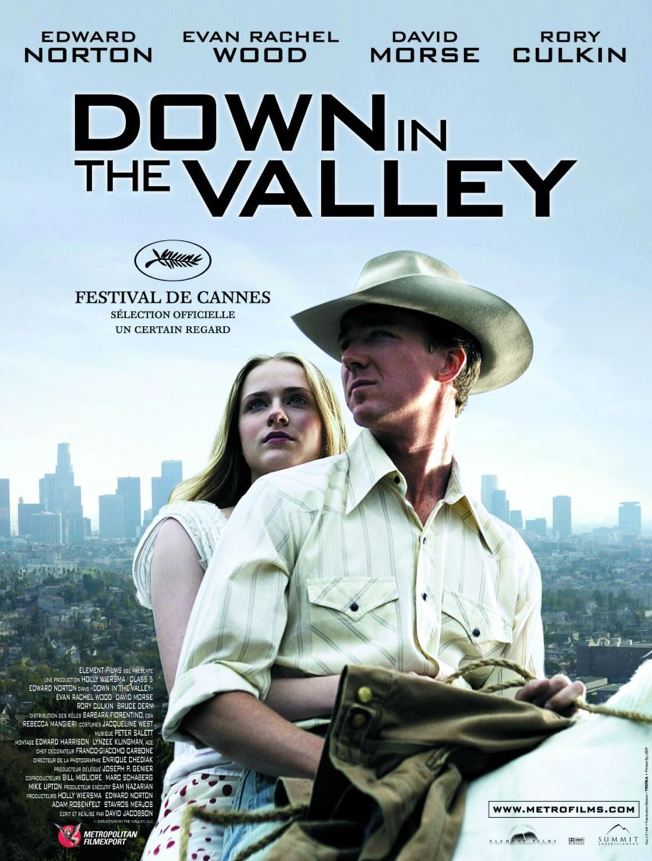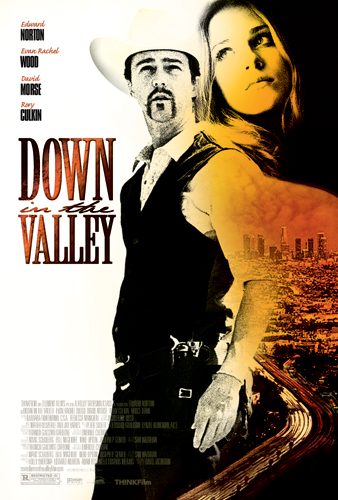
Official Selection of the Cannes Film Festival 2005
DOWN IN THE VALLEY
WRITTEN AND DIRECTED BY DAVID JACOBSON
STARRING EDWARD NORTON, EVAN RACHEL WOOD, DAVID MORSE, BRUCE DERN AND RORY CULKIN.
OVERVIEW
Down in the Valley has an authentic emotional vibe that almost carries you past the movie’s swerve from plaintive romance to something more unhinged. The writer-director, David Jacobson, has caught hold of a great idea and done it justice: the way real love can bloom out of a mutual delusion. Tobe (Evan Rachel Wood) is a nubile Valley Girl who, on a trip with her friends to the beach, gazes through the windshield at the rangy, diffident young man (Edward Norton) in a cowboy hat who fills the car with gas. His quiet, gentle demeanor captures her instantly, and he responds to the steadiness—the un–Valley Girlishness — of her attraction. They make an enchanting pair of ingenues.
Jacobson doesn’t spell out what binds the couple, but the underpinnings are there. The cowboy, Harlan, is the opposite of Tobe’s overbearing corrections-officer father (David Morse). He’s not a creature of the Valley: His eyes are on the mountains, above the smog line. When he takes her out on the horse of a rancher he once worked for, the ride is so transporting that she can’t even process it when the cranky old man (Bruce Dern) claims to have no idea who Harlan is. The best thing about Down in the Valleyis that you hope it’s not going where you have an inkling it’s going. The purity of Norton’s madness is a wonder.
— David Edelstein, New York Magazine
REVIEWS
Down in the Valley,an astonishing tone-poem with the sweep of an essay, and the specificity of a song, is the third feature film by David Jacobson, an artist whose second film,Dahmer was something of an event for cineastes. Dahmer had the look of a film that had crawled out from under a rock-all smut and grit and dull, flickering light. As a movie-creature, it sputtered jokes and violence, as if each was the most natural thing in the world. And in America each is but in Down in the Valley--which has the sunburnt, washed-out look of Robert Altman’s Three Women-Jacobson has grown more moderate in tone. And yet he continues to explore the story behind violence as a series of actions which not only help define but make a character
— Hilton Als, New Yorker
Writer-director David Jacobson, who did a dynamite job with Dahmer, isn’t afraid of plunging into dark, twisted places. You shouldn’t be, either. Down in the Valley is a wild thing that sticks with you long after it’s over. You know, a real movie. (It) dares you to explore the violence of the mind. Take the dare. It’s something rare these days: untamed.
— Peter Travers, Rolling Stone
So few films take you on a journey where the destination is unknown. Down In The Valley has the freedom to roam. Haunting and beautiful, it lingers with you months after viewing and, like a great album, grows richer with repeated play – revealing layers of emotion and meaning. The characters aren’t cut-outs, they are people you need to get to know: flawed and multi-faceted and enthralling. You cannot second guess where they, or the story, will go. Nothing here, and no one, is depicted in black and white. Writer and director David Jacobson subverts expectations.
— Nev Pierce, Total Film

I just had the great pleasure of viewing Down in the Valley, which struck me as the most original and compelling film I’ve seen this year, packed with extraordinary performances and striking visuals, all in the service of a complex and powerful vision. It reminded me of a Dalton Trumbo scripted Kirk Douglas picture that came out in 1962, Lonely Are the Brave, shot through with the spirit of Terry Malick’s Badlands, but here the sum is greater than the parts. In other words, instead of merely lamenting the passing of a way of life or lyricizing mass murderers, which we’ve seen a thousand times before, this film reinvents that vocabulary, takes cultural stereotypes-the “last cowboy,” the “psycho loner”–and examines with infinite sensitivity, tenderness even, the relationship between place, emotion, and self. It’s a hard picture to describe because we’re not used to seeing movies that don’t shout at us, don’t grab us by the lapels, that show instead of gesticulate, but this is one of them. It slowly unfolds an intricate story that is full of surprises and strange twists, and ends on a note of surpassing sadness.
— Peter Biskind, “Easy Riders, Raging Bulls”